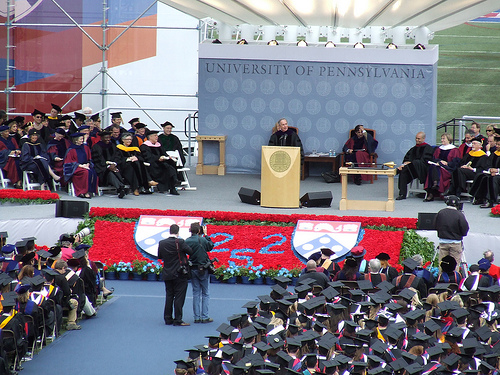
On Monday, I watched the great procession of graduates on Locust walk, and enjoyed the pervasive sense of pride at Penn. Graduation is a very special celebration – when we actually take the time to acknowledge the huge accomplishment it is to complete several years of academic training. Today is quiet on campus, a very dramatic difference from the pomp and circumstance of just two days ago.
And so I began to think…what will the coming weeks be like for the graduates who don’t yet know the next step in their career plans? This blog is for those newly minted alumni who might be feeling a little like procrastinating: don’t let graduation fade into a distant memory – you need this reminder that you can accomplish a great deal, and that you can learn new skills (like how to successfully job search) in the same way you learned the skills required to complete your academic programs. It is really important to stay motivated when you job search, and especially to focus on the things that help you maintain your self esteem.
Unfortunately, when job searching, a person’s “self worth” can take a hit – people often report to me their feeling demoralized or disappointed, especially when the process takes longer than expected or when the search includes rejections from desirable employers. For some graduates, the new release from school obligations actually adds another layer of challenge – a lack of structure in the day. Job seekers may begin to doubt their own productivity, or find there are fewer activities in the day to provide a sense of accomplishment. This quote from the Earl of Chesterfield just about sums up how I think procrastination works: “It is an undoubted truth, that the less one has to do, the less time one finds to do it in.”
In a tough economy, finding the job search to be a discouraging experience is understandable, and at the same time, you will genuinely benefit if you prioritize maintaining your self-esteem and sense of self-efficacy (knowing that you have the ability to make changes in your situation). As a job seeker, you are far better off if you are motivated to learn about new opportunities, face unknowns with confidence, and market yourself because you know that your skills and accomplishments are hard earned, and your ability to get things done will be valued by employers. This attitude is essential for persevering; and persevering is essential for a successful job search.
While you are in the process of looking for work, there are many things you can do to build or maintain self worth. Here are some ideas to get you started on writing your own list:
• Think about a time in school when you faced a new assignment or had to learn a new skill. What did you do to take steps to get it done? When you successfully faced a challenge, what did you learn about yourself?
• Do self assessment, so you understand not only what you are good at, but what you like to do. Some helpful worksheets are listed here.
• Make sure each day has some structure to it – keep busy and reward yourself when you do activities that contribute to your job search.
• Set small and/or measurable goals (I.E. contact 2 new people in my networking, apply to 2 jobs today)
• Continue doing hobbies that you enjoy.
• Exercise regularly – develop and/or maintain healthy habits.
• Review your accomplishments and successes from previous academic projects, internships and work experiences. Talk with former classmates, supervisors or coworkers and friends if you are having a hard time thinking of examples.
• Continue learning and gaining skills – take a noncredit class or workshop or read a book on your own. If you are in Philadelphia, check out the resources of the Philadelphia Free library, or the Career Services library.
• Keep networking and making connections with others. Here is a quick online presentation on networking, and more information and tips from the Career Services web site are here.
• Volunteer – helping others is a great way to know how valuable your efforts are. To find an organization that needs your help, start here.
• Avoid procrastinating, which paradoxically increases anxiety while you avoid the real work of job searching – here are some tips (replace the word “Academic” with “Job Seeker” for the full effect)
• Seek support. Meet with a career advisor (you knew I would say that, right?) – we are here to help, and will be around all summer.
By engaging in constructive activities and thinking about good experiences, you are fostering a positive attitude and strengthening self- esteem. Valuing your accomplishments – believing that you can succeed – can help you take more of the risks that are part of job searching and career planning. You be more open to opportunities that may come your way, at the same time you will be more prepared to take advantage of them. This may lead to an offer-in-hand sooner than you’d expect, and yet another reason to for a newly minted graduate to celebrate.








